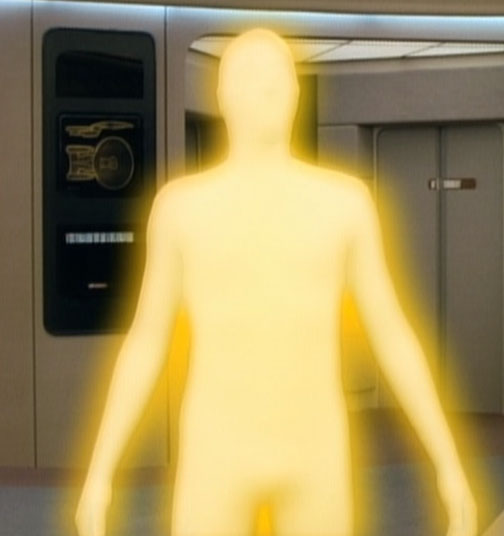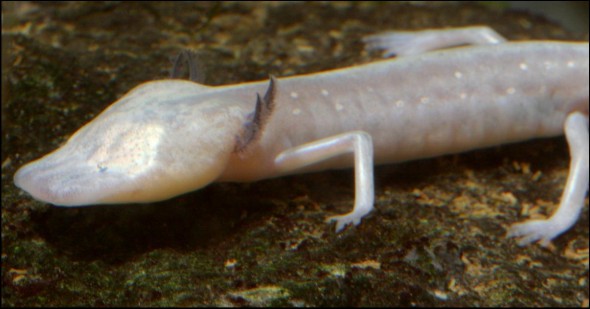Physicist: Awesome question! The very short answer is: nope.
Energy beings are an old staple of sci-fi (a good one), but they’re almost certainly impossible, or at least, it’s almost certainly impossible for life (as we know it) to evolve into energy. Even after billions of years on Earth, life is pretty much the exact same stuff that it’s always been. Several billion years ago single cells figured out how to metabolize, repair damage, and reproduce. Everything since then has pretty much just been variations on that theme (sincerest apologies to our evolutionary biologist readers). The word “evolution” evokes ideas of advancement, and improvement, and ascension, but “in practice” evolution is to accidents as a beach is to grains of sand.
Part of that is that there’s no goal that life is evolving toward, or even a path that life is taking. So, humanity is no more the pinnacle of evolution than every other living thing is.
One of the classic examples of evolution in action is the Peppered Moth. The Peppered Moth, like many species (including people!), appears in a couple different colors and patterns. Normally they’re grey (and peppered), but during the industrial revolution the area around London became so nasty and coal-covered that black peppered moths became far more common. By accident of birth, some moths were black and, by accident of circumstance, they found that they could hide from predators better than their suddenly very visible grey cousins. That’s evolution; it’s not a matter of being better, or even adapting, it’s just a matter of stumbling forward and whatever happens happens.
It would be great if evolution always made things more advanced, but in general, creatures only become as complex as they minimally need to be. If group of critters can get along by becoming simpler, then tend to evolve (accidentally be born) into that simpler form. For example, there are several examples of blind subterranean animals that are descended from species that once had eyes. Again, it’s not that they purposely evolved to be blind, it’s just that sometimes (by accident) you’re born without eyes, and sometimes it doesn’t matter (because you live in a cave). It’s a lot easier (more likely) to lose a feature and become simpler than it is to gain a new feature and become more complex.
It is the case that the lifeforms with the greatest complexity will be found later in history rather than earlier, but that’s pretty much because it takes time for things to become complex. However, for the most part living systems have maintained about the same level of complexity for hundreds of millions of years. The most successful form of life on Earth (arguably) is still single-celled. Those little dudes really have it all figured out.
Long story short: evolution isn’t “leading up” to anything, it just drunkenly limps along using the same set of tricks in slightly different orders.
On the physics side of things, “energy life” sounds like a cool idea, it’s not really a possibility (as far as we can say). Energy generally doesn’t exist on its own without matter, and when it does it’s propagating about at the speed of light (for example: light). Not experiencing time (which is one of the problems with light speed) seems to go against the idea of “life”. That is, if something never changes at all, can it really be alive?
The concept we (sci-fi aficionados) usually have of energy beings, as a kind of beneficent glowing ghost or a giant Kirk-harassing cloud, runs contrary to the physical understanding of energy physicists have developed so far. Despite all the different terms that are used to talk about energy, it only takes a couple forms. At its most base there’s the “energy of stuff” (like the E=mc2 of matter), there’s the “energy of stuff moving” (kinetic energy), and there’s the “potential for stuff to move” (the various forms of potential energy: charged batteries, gasoline, wound clock springs, etc.). A “ball of energy” that’s independent of matter isn’t really a thing.
It would be cool to think that someday something will “evolve into energy”, but pressed for a prediction, I’d say that evolution will continue to stumble around at random for as long as there are living things around to do the stumbling. Evolution is a process of accidental baby steps, and turning into an energy being, even assuming it’s possible, is more of a leap.









23 Responses to Q: Is the final step in evolution an ascension into an energy-based lifeform?